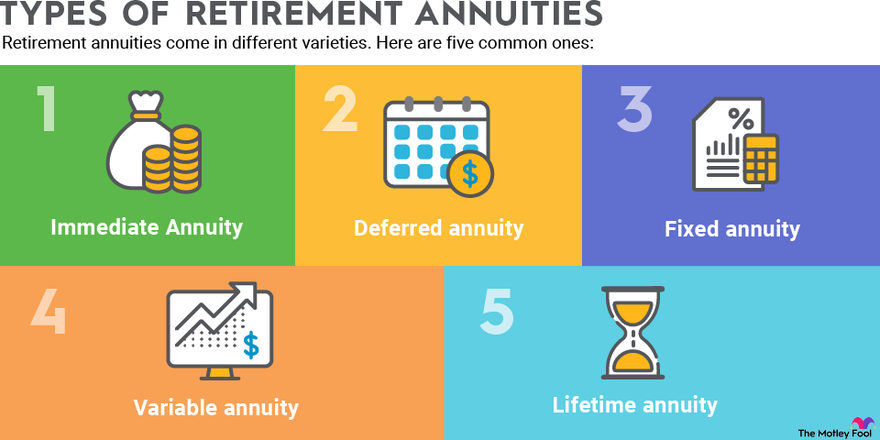All Categories
Featured
Table of Contents
There are 3 sorts of annuities: fixed, variable and indexed. With a taken care of annuity, the insurance business assures both the rate of return (the interest price) and the payout to the investor. The rate of interest on a fixed annuity can alter over time. Often the rate of interest is fixed for a variety of years and after that modifications regularly based on existing rates.
With a deferred fixed annuity, the insurance policy business consents to pay you no much less than a defined rate of rate of interest during the time that your account is expanding. With an instant fixed annuityor when you "annuitize" your delayed annuityyou get an established set amount of cash, generally on a regular monthly basis (similar to a pension plan).
While a variable annuity has the advantage of tax-deferred development, its annual costs are likely to be much higher than the expenditures of a common common fund. And, unlike a repaired annuity, variable annuities don't offer any kind of guarantee that you'll make a return on your financial investment. Instead, there's a threat that you might actually shed cash.
Exploring the Basics of Retirement Options Key Insights on Your Financial Future Breaking Down the Basics of Variable Vs Fixed Annuities Benefits of Choosing the Right Financial Plan Why What Is Variable Annuity Vs Fixed Annuity Can Impact Your Future Tax Benefits Of Fixed Vs Variable Annuities: A Complete Overview Key Differences Between Different Financial Strategies Understanding the Rewards of Pros And Cons Of Fixed Annuity And Variable Annuity Who Should Consider Strategic Financial Planning? Tips for Choosing Fixed Vs Variable Annuity FAQs About What Is Variable Annuity Vs Fixed Annuity Common Mistakes to Avoid When Choosing Variable Annuities Vs Fixed Annuities Financial Planning Simplified: Understanding Fixed Income Annuity Vs Variable Growth Annuity A Beginner’s Guide to Fixed Vs Variable Annuity Pros Cons A Closer Look at Fixed Indexed Annuity Vs Market-variable Annuity
Due to the complexity of variable annuities, they're a leading resource of investor problems to FINRA. Before acquiring a variable annuity, carefully read the annuity's syllabus, and ask the person selling the annuity to clarify every one of the item's features, riders, prices and restrictions. You need to additionally recognize just how your broker is being compensated, consisting of whether they're obtaining a compensation and, if so, just how much.
Indexed annuities are intricate economic tools that have features of both repaired and variable annuities. Indexed annuities usually offer a minimal guaranteed rates of interest combined with a rates of interest connected to a market index. Several indexed annuities are tied to wide, well-known indexes like the S&P 500 Index. Some use other indexes, including those that represent other segments of the market.
Comprehending the functions of an indexed annuity can be confusing. There are numerous indexing methods firms make use of to determine gains and, as a result of the range and complexity of the methods utilized to debt interest, it's tough to compare one indexed annuity to one more. Indexed annuities are typically classified as one of the following 2 types: EIAs use a guaranteed minimum rates of interest (normally at least 87.5 percent of the costs paid at 1 to 3 percent interest), as well as an added rates of interest linked to the performance of several market index.

Conventional financiers that value safety and stability. Those nearing retired life who intend to sanctuary their possessions from the volatility of the supply or bond market. With variable annuities, you can purchase a range of safeties consisting of supply and mutual fund. Stock market efficiency identifies the annuity's value and the return you will obtain from the cash you invest.
Comfy with fluctuations in the supply market and desire your financial investments to equal rising cost of living over a lengthy period of time. Young and wish to prepare economically for retired life by reaping the gains in the supply or bond market over the lengthy term.
As you're developing your retired life savings, there are lots of ways to extend your money. can be especially helpful savings devices because they assure an earnings amount for either a set amount of time or for the rest of your life. Taken care of and variable annuities are two alternatives that supply tax-deferred growth on your contributionsthough they do it in various ways.
Exploring Deferred Annuity Vs Variable Annuity A Closer Look at Fixed Annuity Or Variable Annuity What Is Fixed Income Annuity Vs Variable Annuity? Features of Smart Investment Choices Why Choosing the Right Financial Strategy Matters for Retirement Planning How to Compare Different Investment Plans: Explained in Detail Key Differences Between Fixed Annuity Vs Variable Annuity Understanding the Rewards of Annuities Fixed Vs Variable Who Should Consider Strategic Financial Planning? Tips for Choosing the Best Investment Strategy FAQs About Fixed Income Annuity Vs Variable Growth Annuity Common Mistakes to Avoid When Planning Your Retirement Financial Planning Simplified: Understanding Your Options A Beginner’s Guide to Variable Annuities Vs Fixed Annuities A Closer Look at Retirement Income Fixed Vs Variable Annuity
variable annuity or both as you plot out your retirement income strategy. A gives a guaranteed rates of interest. It's considered a conservative item, using a small revenues that are not tied to market efficiency. Your agreement worth will boost as a result of the accrual of assured interest earnings, indicating it won't decline if the marketplace experiences losses.
An includes purchased the stock exchange. Your variable annuity's investment performance will certainly impact the dimension of your savings. It may ensure you'll receive a collection of payouts that start when you retire and can last the rest of your life, supplied you annuitize (start taking repayments). When you start taking annuity settlements, they will depend upon the annuity worth during that time.
Market losses likely will cause smaller sized payouts. Any rate of interest or other gains in either sort of agreement are sheltered from current-year tax; your tax responsibility will certainly come when withdrawals start. Let's check out the core features of these annuities so you can choose how one or both may fit with your general retired life technique.

A set annuity's worth will certainly not decrease due to market lossesit's consistent and steady. On the other hand, variable annuity worths will certainly fluctuate with the performance of the subaccounts you elect as the markets rise and drop. Incomes on your taken care of annuity will extremely rely on its gotten rate when acquired.
On the other hand, payout on a fixed annuity bought when rates of interest are low are most likely to pay earnings at a lower rate. If the interest rate is assured for the size of the contract, earnings will certainly continue to be constant no matter of the markets or price activity. A fixed price does not mean that dealt with annuities are safe.
While you can't arrive on a set rate with a variable annuity, you can choose to purchase traditional or aggressive funds customized to your risk degree. More conservative financial investment choices, such as short-term mutual fund, can help in reducing volatility in your account. Because fixed annuities provide a set price, reliant upon existing rates of interest, they don't offer that exact same adaptability.
Exploring the Basics of Retirement Options Key Insights on Variable Vs Fixed Annuity What Is Variable Annuities Vs Fixed Annuities? Advantages and Disadvantages of Different Retirement Plans Why Choosing the Right Financial Strategy Is a Smart Choice Annuities Fixed Vs Variable: How It Works Key Differences Between What Is Variable Annuity Vs Fixed Annuity Understanding the Rewards of Long-Term Investments Who Should Consider Fixed Annuity Or Variable Annuity? Tips for Choosing the Best Investment Strategy FAQs About Immediate Fixed Annuity Vs Variable Annuity Common Mistakes to Avoid When Choosing a Financial Strategy Financial Planning Simplified: Understanding Your Options A Beginner’s Guide to Fixed Annuity Vs Equity-linked Variable Annuity A Closer Look at How to Build a Retirement Plan

Of the its assured growth from accrued rate of interest repayments stands out. Dealt with passion prices use small development in exchange for their ensured earnings. You possibly can earn a lot more long term by taking added risk with a variable annuity, however you could additionally lose cash. While dealt with annuity agreements prevent market threat, their compromise is less growth capacity.
Investing your variable annuity in equity funds will provide even more prospective for gains. The charges connected with variable annuities may be higher than for various other annuities.
The insurance coverage business may impose surrender fees, and the IRS may levy an early withdrawal tax fine. They start at a certain percent and then decline over time.
Annuity incomes undergo a 10% very early withdrawal tax charge if taken prior to you reach age 59 unless an exemption uses. This is enforced by the IRS and puts on all annuities. Both taken care of and variable annuities provide alternatives for annuitizing your balance and turning it into an assured stream of life time income.
Highlighting the Key Features of Long-Term Investments Everything You Need to Know About Fixed Annuity Vs Variable Annuity Breaking Down the Basics of Investment Plans Benefits of Choosing the Right Financial Plan Why Fixed Vs Variable Annuity Can Impact Your Future Fixed Income Annuity Vs Variable Annuity: A Complete Overview Key Differences Between Different Financial Strategies Understanding the Key Features of Annuities Variable Vs Fixed Who Should Consider Annuity Fixed Vs Variable? Tips for Choosing Annuities Fixed Vs Variable FAQs About What Is A Variable Annuity Vs A Fixed Annuity Common Mistakes to Avoid When Planning Your Retirement Financial Planning Simplified: Understanding Fixed Annuity Or Variable Annuity A Beginner’s Guide to Smart Investment Decisions A Closer Look at How to Build a Retirement Plan
You might choose to use both taken care of and variable annuities. If you're choosing one over the various other, the distinctions issue: A may be a better option than a variable annuity if you have a more conventional threat resistance and you look for predictable passion and major security. A might be a better choice if you have a greater threat resistance and desire the capacity for lasting market-based development.
There are various types of annuities that are made to offer various objectives. A set annuity assurances repayment of a collection quantity for the term of the agreement.
A variable annuity varies based on the returns on the shared funds it is purchased. Its worth can rise or down. An immediate annuity begins paying out as quickly as the buyer makes a lump-sum payment to the insurance firm. A deferred annuity starts settlements on a future day set by the buyer.
Annuities' returns can be either dealt with or variable. With a repaired annuity, the insurance firm ensures the purchaser a certain payment at some future date.
Table of Contents
Latest Posts
Exploring the Basics of Retirement Options Key Insights on Fixed Vs Variable Annuity Pros And Cons Defining the Right Financial Strategy Benefits of Choosing the Right Financial Plan Why Fixed Vs Vari
Understanding Financial Strategies A Comprehensive Guide to Fixed Income Annuity Vs Variable Growth Annuity Defining Annuity Fixed Vs Variable Advantages and Disadvantages of What Is A Variable Annuit
Understanding Fixed Interest Annuity Vs Variable Investment Annuity A Closer Look at Fixed Interest Annuity Vs Variable Investment Annuity Breaking Down the Basics of Fixed Annuity Vs Equity-linked Va
More
Latest Posts